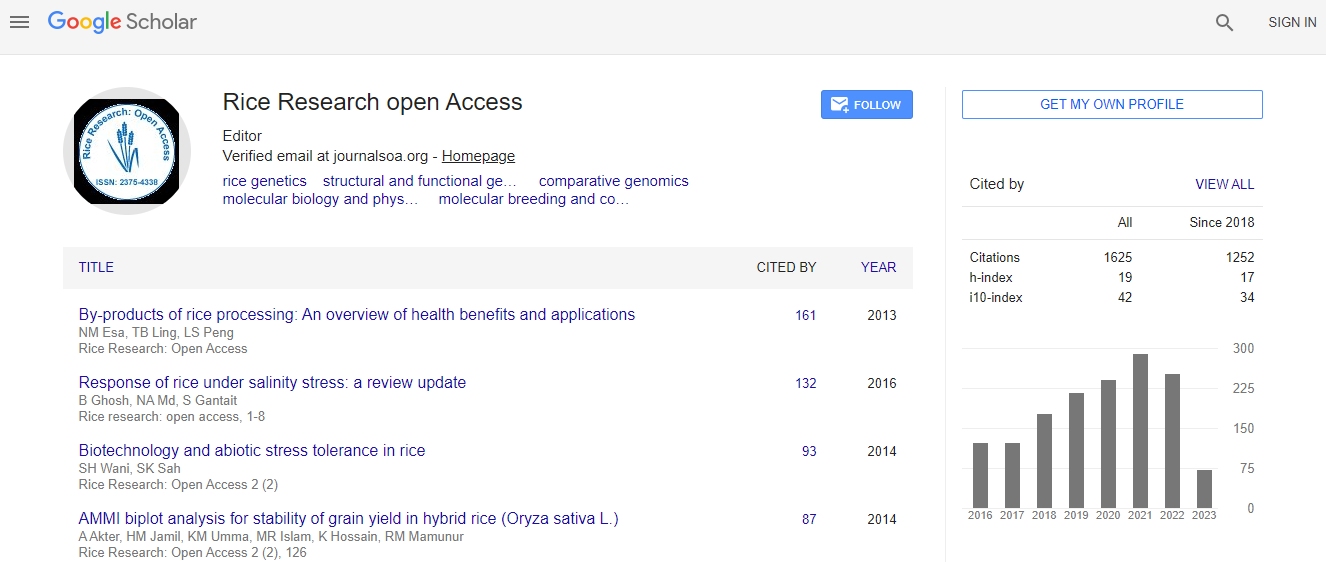Our Group organises 3000+ Global Conferenceseries Events every year across USA, Europe & Asia with support from 1000 more scientific Societies and Publishes 700+ Open Access Journals which contains over 50000 eminent personalities, reputed scientists as editorial board members.
Open Access Journals gaining more Readers and Citations
700 Journals and 15,000,000 Readers Each Journal is getting 25,000+ Readers
Google Scholar citation report
Citations : 2497
Rice Research: Open Access received 2497 citations as per Google Scholar report
Rice Research: Open Access peer review process verified at publons
Indexed In
- Index Copernicus
- Google Scholar
- Open J Gate
- Academic Keys
- Electronic Journals Library
- RefSeek
- Directory of Research Journal Indexing (DRJI)
- Hamdard University
- EBSCO A-Z
- OCLC- WorldCat
- Scholarsteer
- SWB online catalog
- Virtual Library of Biology (vifabio)
- Publons
- Euro Pub
Useful Links
Recommended Journals
Related Subjects
Share This Page
Srinivas K Lanka

Srinivas K Lanka
Postdoctoral Researcher
Department of Entomology
Louisiana State University
Baton Rouge
USA
Biography
Srinivas Lanka is currently a postdoctoral researcher in a collaborative research project funded by the National Science Foundation, entitled-“Scaling up epizootic dynamics - linking individual infection and spatial spread by using a Bayesian hierarchial approach”. This project deals with a tritrophic interaction involving soybeans, fall armyworm, Spodoptera frugiperda, and a baculovirus, Sf NPV. The aim of this project is to determine how differences in food quality for herbivores affect transmission of a virus at different scales- from individual to epizootic scales. To this end, Srinivas is investigating constitutive and inducible resistance in different soybean genotypes against fall armyworm by measuring insect growth rates and food consumption. He aims to determine different biochemical correlates of inducibility in soybeans by using enzyme activity assays. The candidate enzymes in his research include peroxidases, polyphenol oxidases and lipoxygenases and proteinases inhibitors. His larger goal is to integrate information from foliar consumption and chemical induction to predict the probability of Sf NPV infection in larvae. Srinivas graduated with Ph.D in Entomology in 2012 from Louisiana State University. For his dissertation, he developed an applied research program to investigate various aspects of the use of neonicotinoid and anthranilic diamide seed treatments in rice. These seed treatment insecticides are systemic and have been used for management of the rice water weevil, Lissorhoptrus oryzophilus, in the southern US. His research revealed the potential for integrating seed treatments with non-chemical methods for integrated management and demonstrated the compatibility of seed treatments with crawfish production. His research projects addressed aspects such as biological characterization of the effects of each insecticide on various life stages of L. oryzophilus, adult susceptibility to thiamethoxam, patterns of distribution of seed treatment insecticides in rice and sublethal impacts of these seed treatments on oviposition behavior. To characterize adult susceptibility (LD 50), data on foliar biomass consumption by adult weevils from plants that received seed treatments were used in conjunction with insecticide concentrations as measured by LC/MS/MS. Plant growth-related influence on systemic activity of thiamethoxam was also determined by ELISA. These experiments provided a basic understanding of how both insecticide classes differ in their activity against weevils and in their distribution pattern of active ingredients in rice plants. Srinivas has broad interests in research with a focus on integrated pest management. His interests are on non-target effects of agrochemicals on beneficial arthropods and indirect effects of agrochemical treatments on plants. Before Srinivas came to U.S for pursuing Ph.D, he served in research and extension organizations in India. He had gained experience in field biology of insects in different field crops.
Research Interest
Integrated pest management; non-target effects of agrochemicals on arthropods; indirect effects of systemic insecticides on plants; tritrophic interactions and induced resistance, Stress resistance
Global Speakers in the subject
Global Experts in the subject
Publications
Insecticidal Seed Treatments in Rice
| Srinivas K Lanka and Michael J Stout |
| Editorial: J Rice Res 2015,3: e112 |
| DOI: 10.4172/2375-4338.1000e112 |

 Spanish
Spanish  Chinese
Chinese  Russian
Russian  German
German  French
French  Japanese
Japanese  Portuguese
Portuguese  Hindi
Hindi 

